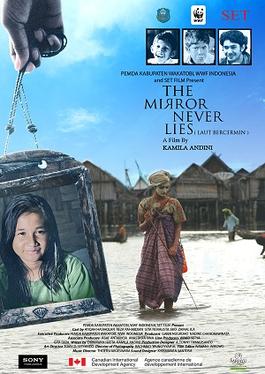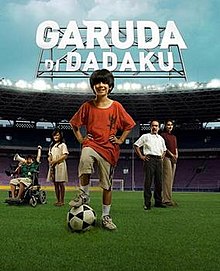Jakarta International Film Festival or JiFFest is the major film festival of Indonesia held every December in the capital, Jakarta, since 1999. The festival is on a shaky financial footing and is hoping to continue by switching its funding source from foreign donors to government grants and private donations.

Alessandra Khadijah Usman is an Indonesian film actress, Ambassador for Ministry of Tourism of Indonesia, model and beauty pageant titleholder who won the Puteri Indonesia Pariwisata of Puteri Indonesia 2010, and automatically acquired the title Puteri Indonesia Pariwisata 2010. She represented Indonesia in Miss Asia Pacific World 2011, where she ended-up won 1st Runner-up and Best Style Dress award in the pageant.
Hanny R. Saputra is an Indonesian director. One of his films, Under the Protection of Ka'Bah, was Indonesia's submission for the Academy Award for Best Foreign Language Film in the 84th Academy Awards.
Titik Handayani Rajo Bintang, known professionally as Titi Radjo Padmaja, is an Indonesian award winning composer, drummer, singer, songwriter, and actress.

The Dancer is a 2011 Indonesian film based on the trilogy of novels Ronggeng Dukuh Paruk by Ahmad Tohari and directed by Ifa Isfansyah. Starring Nyoman Oka Antara and Prisia Nasution, it tells the story of a young man and his friendship with his small village's new ronggeng.
Prisia Wulansari Nasution or better known as Prisia Nasution is an Indonesian actress, model and martial artist of mixed Javanese and Batak descent.

Ifa Isfansyah is an Indonesian film director. Initially a maker of short films, his first featured film, Garuda di Dadaku, was released in 2009. His following film, Sang Penari, won four Citra Awards at the 2011 Indonesian Film Festival.

Oka Antara is an Indonesian actor of Balinese descent. He is best known for starring in the films Sang Penari (2011), V/H/S/2 (2013), Killers (2014), and The Raid 2 (2014).
Fiksimini, also spelled fiksi mini, is an Indonesian internet community based on Twitter in which followers or fans write short compositions to pique reader interest. Its participants are known as Fiksiminiers.
NTRL is an Indonesian rock band formed in 1991 in Jakarta. The band has released 13 albums. Its current members are Bagus, Eno (drums) and Coki (guitar).
John de Rantau is an Indonesian film director. His film Denias Senandung Di Atas Awan was Indonesia's submission to the 80th Academy Awards for Best Foreign Language Film, but not nominated.

Atiqah Hasiholan Alhady is an Indonesian-Arab actress and model.

Salman Aristo is an Indonesian screenwriter and film director best known for his work on Ayat-Ayat Cinta, Laskar Pelangi, Garuda di Dadaku, and Sang Penari.

Mira Lesmanawati or better known as Mira Lesmana is an Indonesian film director, producer and songwriter of mixed Dutch, Javanese and Madurese descent. She is the elder sister of Indonesian jazz musician, Indra Lesmana.

Brownies is a 2004 Indonesian film directed by Hanung Bramantyo. It is about a career woman who falls for an entrepreneur over their mutual love of brownies.
Naif was an Indonesian rock band from Jakarta formed in 1995. The band consisted of David Bayu Danangjaya (vocals), Fajar Endra Taruna Mangkudisastro, Franki Indrasmoro Sumbodo (drums), and Mohammad Amil Hussein. They were known for their retro sound and style. Two of their songs, "Mobil Balap" ("Racecar") and "Posesif" ("Possessive"), were listed by Rolling Stone Indonesia in its 2009 list of the best Indonesian songs of all time. The band disbanded in 2021 after exactly 25 years.
Nino Fernandez is an Indonesian actor of Minahasan, Sundanese, Jawa Barat, German and Portuguese descent. He's the older brother of singer Millane Fernandez.

Get Married 2 is a 2009 Indonesian romantic comedy directed by Hanung Bramantyo and starring Nirina Zubir and Nino Fernandez. A sequel to the 2007 hit Get Married, it details the efforts of Mae and Rendy to have children.

The Mirror Never Lies is a 2011 Indonesian film directed by Kamila Andini and co-produced by Andini's father, Garin Nugroho, and former Puteri Indonesia Nadine Chandrawinata. Starring Gita Novalista, Atiqah Hasiholan, and Reza Rahadian, it follows a young Bajau girl named Pakis who has lost her father at sea and uses mirrors to unsuccessfully search for him. It has several interpretations, including as a coming-of-age story and as an environmentalist piece.

Kamila Andini is an Indonesian film director known for her critically acclaimed debut, The Mirror Never Lies.











